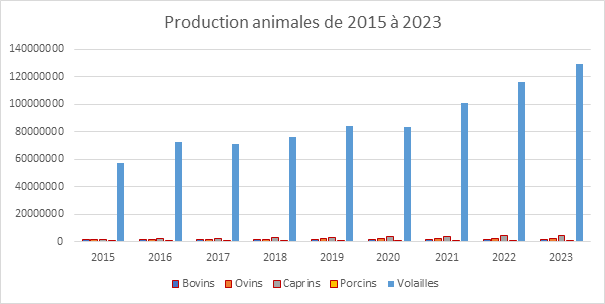The Government's vision regarding animal and fish production is to develop it and make it competitive in order to reduce Côte d'Ivoire's dependence on external sources.
Thus, in order to achieve self-sufficiency in animal and fish proteins, the Ivorian Government adopted the National Policy for the Development of Livestock, Fishing, and Aquaculture 2022-2026 (PONADEPA 2022-2026) in 2022. This policy, which is estimated to require 1,049.443 billion CFA francs for its implementation, aims to achieve three strategic objectives: (i) improving the productivity and competitiveness of animal and fishery sectors in line with environmental protection principles, (ii) enhancing governance, and (iii) improving the livelihoods of stakeholders.
PONADEPA 2022-2026 is aligned with the National Development Plan (PND) 2021-2025 and aims to achieve an annual coverage rate of 60% of national needs for meat and offal through domestic production by 2025, up from 48% in 2022.
The livestock sub-sector has seen a significant improvement, with the national coverage rate for meat and offal needs rising from 49% in 2016 to 56% during the period from 2019 to 2023.
From 2015 to 2023, the herds of cattle, sheep, goats, pigs, and poultry have increased at an average annual rate of 1.85%, 3.96%, 11.93%, 2.2%, and 10.69%, respectively.

Source: Ministry of Animal and Fish Resources / DPSP
Despite these improvements, Côte d'Ivoire remains dependent on imports to meet its animal protein needs. In 2019, imports of ruminant meats and various derivatives amounted to 153,281 tons, contributing 54% to the coverage of national consumption.
It should be noted that the Ivorian poultry sector is experiencing a satisfactory growth trend in terms of production in terms of headcount and consumption eggs. It boasts an excellent coverage rate (95-98%) of the country's poultry meat consumption.
